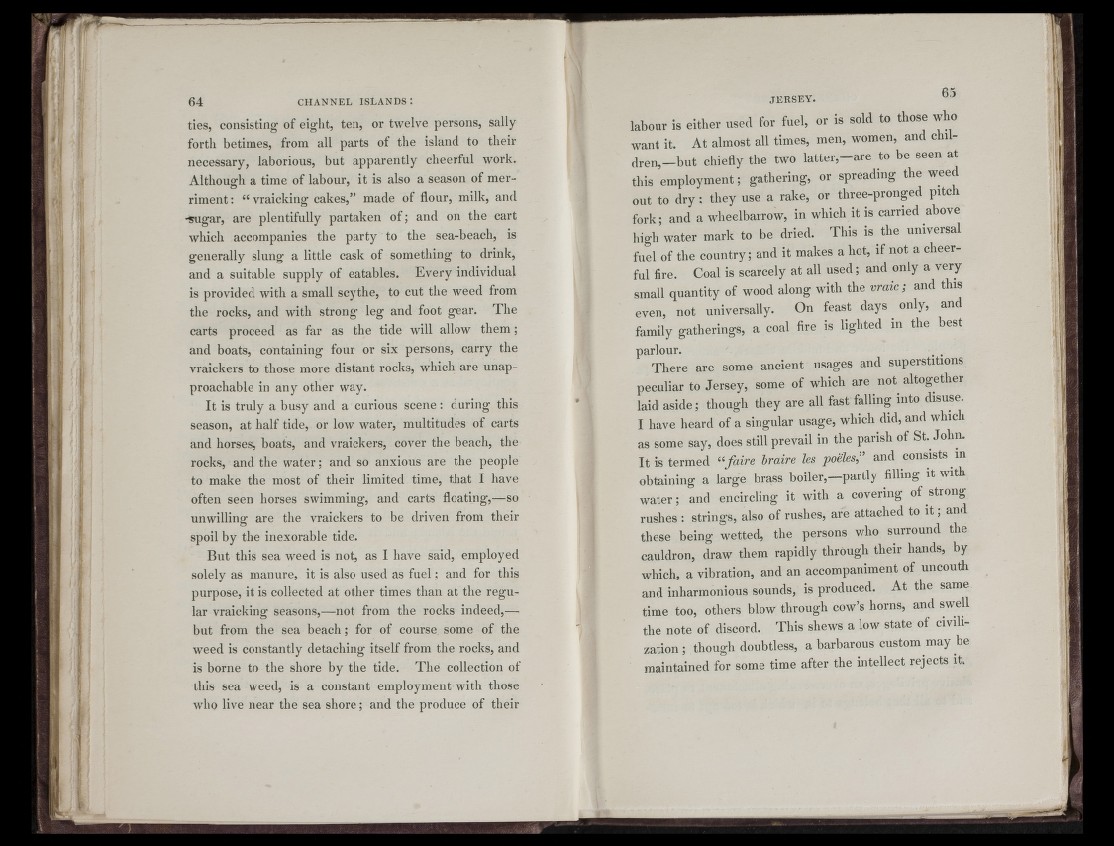
f ' fi ' ■VD I1
1 / |! ■!'^
m ■
Gj
i
1
jli
11
h, 1
■ i,ï
.V '-1r^
‘ï JÎ
î I
6 4 CHANNEL i s l a n d s :
ties, consisting of eight, ten, or twelve persons, sally
forth betimes, from all parts of the island to their
necessary, laborious, but apparently cheerful work.
Although a time of labour, it is also a season of merriment
: “ vraicking cakes,” made of flour, milk, and
'S'ugar, are plentifully partaken o f; and on the cart
whicli accompanies the party to the sea-beach, is
generally slung a little cask of something to drink,
and a suitable supply of eatables. Every individual
is provided with a small scythe, to cut the weed from
the rocks, and with strong leg and foot gear. The
carts proceed as far as the tide will allow them;
and boats, containing four or six persons, carry the
vraickers to those more distant rocks, which are unapproachable
in any other way.
It is truly a busy and a curious scene : during this
season, at half tide, or low water, multitudes of carts
and horses, boats, and vraickers, cover the beach, the
rocks, and the water: and so anxious are the people
to make the most of their limited time, that I have
often seen horses swimming, and carts floating,—so
unwilling are the vraickers to be driven from their
spoil by the inexorable tide.
But this sea weed is not, as I have said, employed
solely as manure, it is also used as fuel; and for this
purpose, it is collected at other times than at the regular
vraicking seasons,—not from the rocks indeed,—
but from the sea beach; for of course some of the
weed is constantly detaching itself from the rocks, and
is borne to the shore by the tide. The collection of
this sea weed, is a constant employment with those
who live near the sea shore; and the produce of their
t ■
JERSEY. 3 5
labour is either used for fuel, or is sold to those who
want it. At almost all times, men, women, and child
r e n ,-b u t chiefly the two la tte r,-a re to be seen at
this employment ; gathering, or spreading the weed
out to dry : they use a rake, or three-pronged pitch
fork- and a wheelbarrow, in which it is carried above
higl.’water mark to be dried. This is the universal
fuel of the country; and it makes a hot, if not a cheerful
fire. Coal is scarcely at all used ; and only a very
small quantity of wood along with the vmic; and this
even, not universally. On feast days only, and
family gatherings, a coal fire is lighted in the best
parlour.
There are some ancient usages and superstitions
peculiar to Jersey, some of which are not altogether
laid aside ; though they are all fast falling into disuse.
I have heard of a singular usage, which did, and which
as some say, does still prevail in the parish of St. John.
I t is termed “faire hraire les poeles” and consists m
obtaining a large brass boiler,—partly filling it with
water; and encircling it with a covering of strong
rushes : strings, also of rushes, are attached to it ; and
these being wetted, the persons who surround the
cauldron, draw them rapidly through their hands, by
which, a vibration, and an accompaniment of uncouth
and inharmonious sounds, is produced. At the same
time too, others blow through cow’s horns, and swell
the note of discord. This shews a low state of civilization
; though doubtless, a barbarous custom may be
maintained for some time after the intellect rejects it.
I T